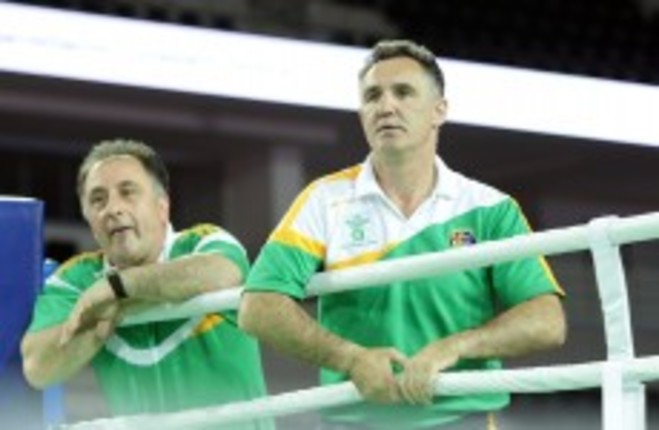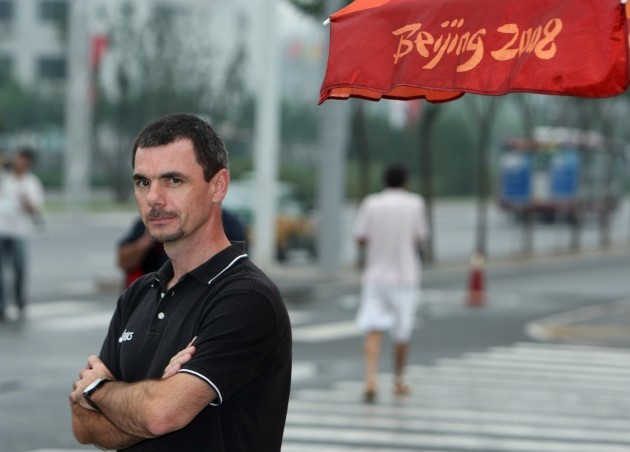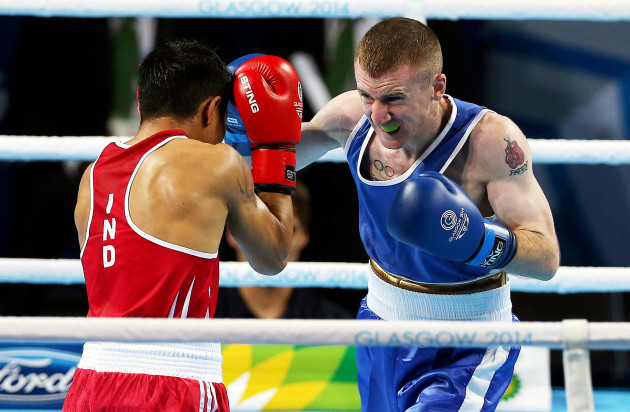THREE PEOPLE HAVE contributed more than any other to the recent success of Irish amateur boxers. Gary Keegan helped create the High Performance Unit that has yielded seven medals in the last two Olympic games. Billy Walsh was the head coach who lead the fighters to glory and Georgian Zaur Antia was his talented number two who helped hone the skills of Paddy Barnes, Katie Taylor and many others.
Following disagreements with the IABA – the sports governing body – Keegan and Walsh have been run out of town, which leaves Zaur as the remaining link to the team that helped infuse Irish boxing with a belief and structure that has delivered unprecedented success.
Punching Above Their Weight by Sunday World journalist Sean McGoldrick is a book that explores the genesis of Irish boxing’s success at Olympic Games but mainly focuses on the history of the High Performance Unit and how Keegan, Walsh and Antia – along with a golden generation of fighters – helped establish Ireland as an amateur boxing powerhouse.
Boxing seems to have more interesting characters per person than any other sport and this tale is no different, with the discovery of Zaur Antia and his journey to Ireland a particular highlight.
“Dan O’Connell was an IABA coach and referee and had befriended a Georgian referee who was Zaur’s best friend over in the city of Poti in Georgia,” McGoldrick says. “O’Connell was over in Poti doing a referee’s course and he noticed Zaur at the other end of the gym. It must have been a boxing coach thing because he recognised something about Zaur immediately. [Gary] Keegan was overawed by his CV and besides wanting him to come in to coach, his dream was to get the Irish boxers over to Russia for a training camp and he thought Zaur could use his connections to make that happen, which he did. But the Irish boxers were so successful in Beijing that they were only invited back once more!”
O’Connell tried to give Zaur a crash-course in English in the week before his interview with the IABA but his training demonstration was so impressive that they overlooked the language barrier.
In fact, McGoldrick says that when the Georgian arrived in Ireland he only had six words of English – ‘Where I go, there is victory’.
The appointment of Zaur in 2003 came on the back of the establishment of the High Performance Unit back in late 2002. Ireland had performed dismally at the Sydney Olympics in 2000 with only one boxer qualifying and hadn’t won a single bout at the previous two European Championships.
The Irish Sports Council had been set-up after the Sydney games and they had designated four sports – boxing, athletics, swimming and equestrian – that they wanted to target with funding.
It appeared to be an ideal time for the top people in the IABA to launch a High Performance Unit so that the nation’s most promising boxers could have a centre of excellence but the onus was left on Gary Keegan to put it together.
“The IABA didn’t even apply for funding in the first year,” McGoldrick says.
“Gary Keegan was on the coaching committee and when he heard in a meeting that no application had been made he took it upon himself to do so.”
One of Keegan’s first acts was to bring in Billy Walsh as head coach and he immediately looked to do things his own way, in particular, wanting to train the boxers in the HPU without interference from their usual coaches.
“Billy gathered all the boxers and the trainers at the National Stadium for a training session and said ‘could each trainer please leave’,” McGoldrick says.
“That didn’t go down well and it might have sowed the seeds of what was to come later.”
Given that Keegan and Walsh have ultimately departed Irish boxing despite achieving great success, it begs the question of whether the IABA truly value the work done by the HPU.
“Initially they [the IABA] seemed to welcome it,” McGoldrick says.
“There were two structural issues though. The HPU could pick a team to travel to a major championship but it needed to be signed off on by the IABA council – it has 38 members. Billy used to say ‘Even a junior GAA manager doesn’t need to put a team before a committee’.”
Walsh disliked the interference from the IABA when it came to picking a team but before the 2007 World Championships they successfully lobbied to have Paddy Barnes added to the roster – and he qualified for the Olympics and took home a bronze medal as a result.
The other structural issue that caused problems between the HPU and the IABA was the role of team manager. The IABA appointed someone to the role before the Beijing Olympics although many within the HPU expected the position to be filled by Keegan.
By snubbing Keegan for the position, it meant the HPU director couldn’t be accredited to stay in the Olympic Village with the boxers, which led to an embarrassing situation.
“The IABA wanted one of its members to be the team manager and travel with the boxers to competitions – it was seen as a big perk,” McGoldrick says.
“Journalists had more official access to the boxers than Keegan. He was staying in an apartment outside the Olympic village and he would have to meet them outside the venue.”
With that context, it isn’t that much of a surprise that Walsh and the IABA couldn’t agree over a new contract. Walsh had basically been double jobbing as both the head coach of the Irish boxing team and the director of the HPU while only being paid for one role.
His assistant was also reassigned and replaced with someone who reported directly to the IABA. With Walsh’s recent departure to the USA boxing team, McGoldrick thinks it is imperative that Zaur Antia is promoted in his place, but thinks the legacy left by the Wexford coach should sustain the team through the upcoming Olympic Games in Rio de Janeiro.
“This shows Billy’s commitment to Ireland – before he left he sent a program to the boxers mapping out their preparation up to the Olympics so in the short-term it won’t make a massive difference,” McGoldrick says.
“It was a disaster when Billy left, if Zaur left too it would be catastrophic.”
Punching Above Their Weight was nominated for Irish Sports Book of the Year and can be purchased here.



